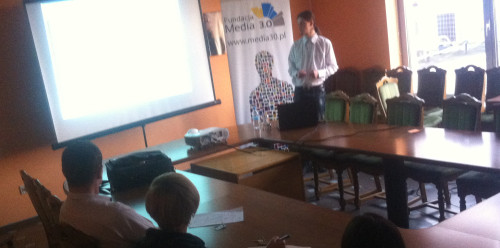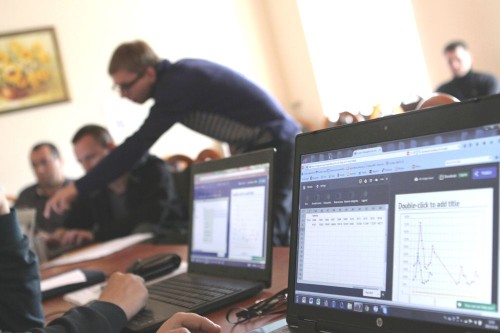We conduct training in the most popular programming languages, from beginner to the most advanced levels. Our classes are intended for not only those who want to learn a new profession, but also everyone who want to expand their knowledge and skills in a digital world. Our training is addressed to companies, institutions, schools, and individuals.
The training subject matter includes the following languages:
- PHP
- JavaScript (including libraries such as D3js and P5JS)
- TypeScript
- Ruby
- Java
- C++
- Python
- Delphi
- C
- SQL
- Processing
Training includes basic subjects, from logic thinking using Scratch software for the youngest users to the utilization of neural networks.
Training in new media includes primarily digital data processing, and gaining skills and knowledge on new media in the digital world. New media classes involve such skills as audio/video signal processing (including the using of such software as Max/MSP, Processing, and Adobe suites), creative coding (e.g. creating audiovisual and interactive installations such as mapping), and creating interactive electronic systems (based on Arduino or own electronic circuits, among others).

Contemporary journalists face a different problem – not the lack of data, but its abundance. During data journalism classes, we teach how to navigate the data jungle, where to seek it, and how to handle it. Our classes are based on experience in running websites and apps such as Ktorzadzi.pl and Parlament, as well as Poland’s first data journalism website – Datablog.pl. We also cooperate with one of the best data journalism organizations – Madrid’s Civio Foundation and American Sunlight Foundation. We place particular emphasis on data visualization. We show how to utilize it to tell complex stories. Having regard to tight newsroom budgets, we teach data visualization using free software available online, so that every participant could apply their newly gained knowledge in their work. Our offer also includes subjects from the border of journalism and programming. We conduct classes in languages and tools such as Processing, R, or D3 libraries, as well as free applications such as Plot.ly, Infogr.am, Poktochart, Timeline.js, and free ICT data processing tools.

Information is no longer the domain of printed press. However, not many people understand the power of contemporary Internet tools. Our classes are primarily aimed at those who want to dive into the world of new technologies dedicated to journalists, as well as those who want to expand their skills in digital data processing. During the classes, we not only present modern ICT tools, but also present ideas of approach to new media. Classes include such subjects as mobile journalism, ICT in data processing, multimedia reporting, investigative journalism, public databases, legal matters of data processing, public information access, and re-use.
Conscious, and – what’s most important – critical approach to media is currently a key issue shaping our lives. During media education classes, we teach media theory and critical approach to it; we also develop the skills of conscious using of media or ICT technologies. Classes are aimed at not only schools or institutions, but also non-governmental organizations or individuals who want to find their place in the information deluge and gain skills in distinguishing information and its sources, and differentiate between methods of its presentation. During classes we also teach using modern media, such as social media, audiovisual materials, and creating simple websites. We also develop information gathering skills and creating your own information materials.
Gaining and developing digital competence in today’s world is a basis of education. We use Internet tools and applications every day, to take care of even the most mundane things. Communication between citizens and government offices also moves online increasingly often. How to find way in contemporary digital world? How to secure oneself from intruders and savely store data? These questions will be answered during our classes. Our classes don’t focus on teaching how to use particular tools; we rather teach how to approach the Internet and digital machines. We try to teach skills that will enable everyone to freely use Internet tools and digital devices. Using the Internet, computers, and other devices consciously is today the foundation of security.
Our mission is the greatest possible availability of Internet tools. The application of the WCAG 2.0 standard allows to precisely resolve whether or not any given site is user-friendly, also for persons with disabilities. During training, we conduct classes for programmers, website designers, and content editors. The training include all CMS systems (Drupal, WordPress, and Joomla, among others). Participants also receive our own content editor handbook, in order to maintain WCAG 2.0 standards at their websites.
News
Poszukujemy stażysty/-tki na stanowisko specjalisty/-tki ds. fundraisingu
Do nowootwartego labu technologicznego w Rybniku poszukujemy stażysty/tki na stanowisko specjalisty/tki ds. fundraisingu. Nasz lab mieści się na kampusie uniwersyteckim w Rybniku.
Przeszkoliliśmy pracowników UM Jastrzębie-Zdrój
W ubiegłym tygodniu po ra kolejny szkoliliśmy pracowników samorządowych ze stosowania standardu WCAG 2.0 AA. Tym razem prowadziliśmy szkolenie w Urzędzie Miejskim w Jastrzębiu-Zdroju.
Data 3.0 – maraton wizualizowania danych
Ubiegły tydzień upłynął nam pod znakiem szkolenia Data 3.0. Przez trzy dni z dziennikarzami z ponad 20 redakcji mediów ogólnopolskich i regionalnych zbieraliśmy i wizualizowaliśmy dane publiczne. Na naszym celowniku w związku ze zbliżającymi się wyborami parlamentarnymi, znaleźli się kandydaci na posłów i senatorów. Czytaj więcej
Contact
[contact-form-7 404 "Not Found"]



